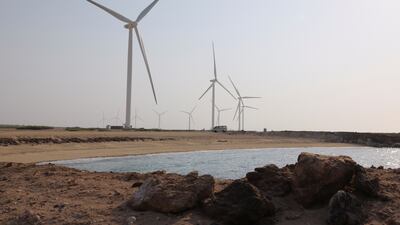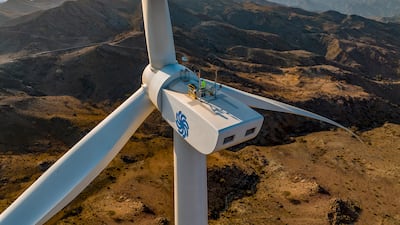The UAE, the Arab world's second-largest economy, is to launch more large-scale solar projects by 2030 to meet the growing demand for clean energy, the energy minister said.
The country, which aims to achieve net-zero emissions by 2050, will initiate “one or two” solar farms a year until the end of the decade, similar to those developed by Abu Dhabi, Suhail Al Mazrouei told the RAK Energy Summit on Thursday.
“We are seeing probably the highest [energy] demand ever because of the economic growth that we're seeing in the country,” Mr Al Mazrouei said.
The UAE government seeks to hit a 2030 target of generating 30 per cent of its energy from clean sources, including renewable energy and nuclear power.
“Today, we have around six gigawatts of renewable energy [and] we're targeting to develop 15 gigawatts and hopefully more by 2030,” Mr Al Mazrouei said.
Last year, Abu Dhabi inaugurated the two-gigawatt Al Dhafra solar power plant, one of the world's largest solar projects.
It supplies power to 200,000 homes and is expected to cut Abu Dhabi's carbon dioxide emissions by more than 2.4 million tonnes annually, equal to removing about 470,000 cars from the road.
Abu Dhabi, which supplies electricity to the Northern Emirates, has the “cleanest grid” in the Middle East, with a carbon intensity of 270 grams of carbon-dioxide per kilowatt hour, compared to the global average of more than 400 grams of carbon dioxide per kilowatt hour, Mr Al Mazrouei said.
The Barakah nuclear power plant in Abu Dhabi now generates 40 terawatt-hours of electricity a year, providing up to 25 per cent of the UAE's electricity.
The minister said that the Emirates would continue to invest in sustainable aviation fuel and the infrastructure needed to produce green hydrogen, adding that artificial intelligence would be a “huge” driver of electricity demand.
The UAE aims to produce 1.4 million metric tonnes of hydrogen annually by 2031 and 15 million metric tonnes a year by 2050.
The Emirates has long championed the use of AI, launching various initiatives following the unveiling of the UAE Strategy for AI in 2017, which kick-started the creation of smart systems in key sectors.
The International Energy Agency forecasts that data centres’ total electricity consumption could more than double to 1,000 terawatt-hours by 2026, up from 460 terawatt-hours in 2022.









